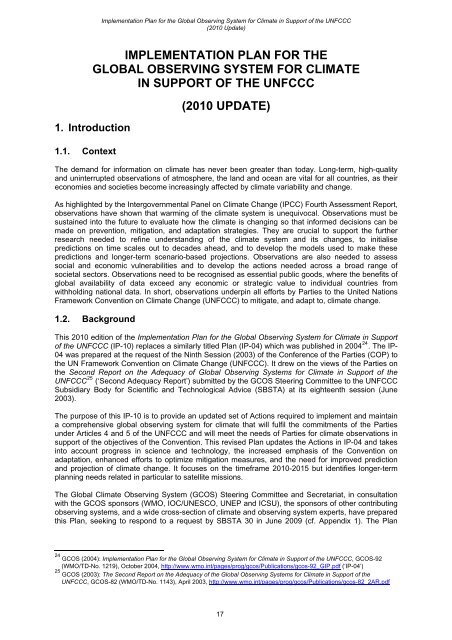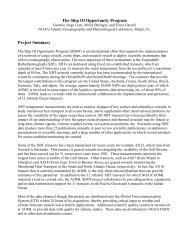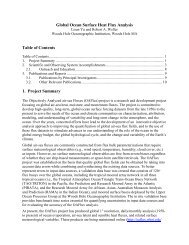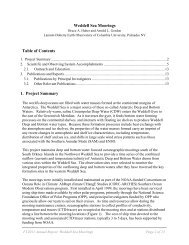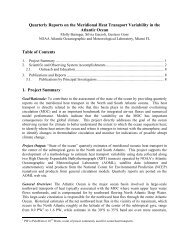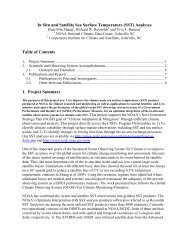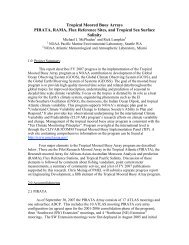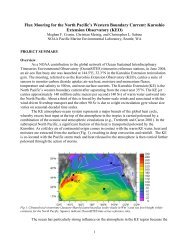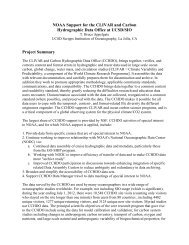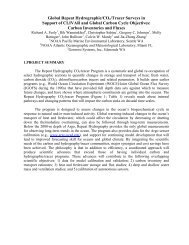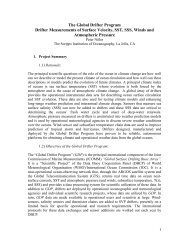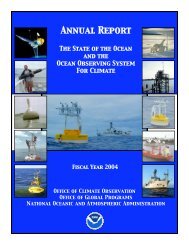GCOS Implementation Plan - WMO
GCOS Implementation Plan - WMO
GCOS Implementation Plan - WMO
Create successful ePaper yourself
Turn your PDF publications into a flip-book with our unique Google optimized e-Paper software.
<strong>Implementation</strong> <strong>Plan</strong> for the Global Observing System for Climate in Support of the UNFCCC<br />
(2010 Update)<br />
IMPLEMENTATION PLAN FOR THE<br />
GLOBAL OBSERVING SYSTEM FOR CLIMATE<br />
IN SUPPORT OF THE UNFCCC<br />
1. Introduction<br />
1.1. Context<br />
(2010 UPDATE)<br />
The demand for information on climate has never been greater than today. Long-term, high-quality<br />
and uninterrupted observations of atmosphere, the land and ocean are vital for all countries, as their<br />
economies and societies become increasingly affected by climate variability and change.<br />
As highlighted by the Intergovernmental Panel on Climate Change (IPCC) Fourth Assessment Report,<br />
observations have shown that warming of the climate system is unequivocal. Observations must be<br />
sustained into the future to evaluate how the climate is changing so that informed decisions can be<br />
made on prevention, mitigation, and adaptation strategies. They are crucial to support the further<br />
research needed to refine understanding of the climate system and its changes, to initialise<br />
predictions on time scales out to decades ahead, and to develop the models used to make these<br />
predictions and longer-term scenario-based projections. Observations are also needed to assess<br />
social and economic vulnerabilities and to develop the actions needed across a broad range of<br />
societal sectors. Observations need to be recognised as essential public goods, where the benefits of<br />
global availability of data exceed any economic or strategic value to individual countries from<br />
withholding national data. In short, observations underpin all efforts by Parties to the United Nations<br />
Framework Convention on Climate Change (UNFCCC) to mitigate, and adapt to, climate change.<br />
1.2. Background<br />
This 2010 edition of the <strong>Implementation</strong> <strong>Plan</strong> for the Global Observing System for Climate in Support<br />
of the UNFCCC (IP-10) replaces a similarly titled <strong>Plan</strong> (IP-04) which was published in 2004 24 . The IP-<br />
04 was prepared at the request of the Ninth Session (2003) of the Conference of the Parties (COP) to<br />
the UN Framework Convention on Climate Change (UNFCCC). It drew on the views of the Parties on<br />
the Second Report on the Adequacy of Global Observing Systems for Climate in Support of the<br />
UNFCCC 25 (‘Second Adequacy Report’) submitted by the <strong>GCOS</strong> Steering Committee to the UNFCCC<br />
Subsidiary Body for Scientific and Technological Advice (SBSTA) at its eighteenth session (June<br />
2003).<br />
The purpose of this IP-10 is to provide an updated set of Actions required to implement and maintain<br />
a comprehensive global observing system for climate that will fulfil the commitments of the Parties<br />
under Articles 4 and 5 of the UNFCCC and will meet the needs of Parties for climate observations in<br />
support of the objectives of the Convention. This revised <strong>Plan</strong> updates the Actions in IP-04 and takes<br />
into account progress in science and technology, the increased emphasis of the Convention on<br />
adaptation, enhanced efforts to optimize mitigation measures, and the need for improved prediction<br />
and projection of climate change. It focuses on the timeframe 2010-2015 but identifies longer-term<br />
planning needs related in particular to satellite missions.<br />
The Global Climate Observing System (<strong>GCOS</strong>) Steering Committee and Secretariat, in consultation<br />
with the <strong>GCOS</strong> sponsors (<strong>WMO</strong>, IOC/UNESCO, UNEP and ICSU), the sponsors of other contributing<br />
observing systems, and a wide cross-section of climate and observing system experts, have prepared<br />
this <strong>Plan</strong>, seeking to respond to a request by SBSTA 30 in June 2009 (cf. Appendix 1). The <strong>Plan</strong><br />
24 <strong>GCOS</strong> (2004): <strong>Implementation</strong> <strong>Plan</strong> for the Global Observing System for Climate in Support of the UNFCCC, <strong>GCOS</strong>-92<br />
(<strong>WMO</strong>/TD-No. 1219), October 2004, http://www.wmo.int/pages/prog/gcos/Publications/gcos-92_GIP.pdf (‘IP-04’)<br />
25 <strong>GCOS</strong> (2003): The Second Report on the Adequacy of the Global Observing Systems for Climate in Support of the<br />
UNFCCC, <strong>GCOS</strong>-82 (<strong>WMO</strong>/TD-No. 1143), April 2003, http://www.wmo.int/pages/prog/gcos/Publications/gcos-82_2AR.pdf<br />
17


